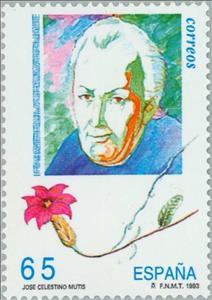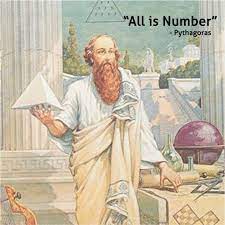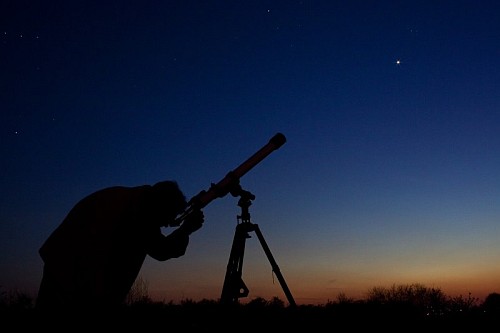Stamp: Explorers - José Celestino Mutis (Spain 1993)
Explorers - José Celestino Mutis (Spain 1993)
20 September (Spain ) within release Famous people goes into circulation Stamp Explorers - José Celestino Mutis face value 65 Spanish peseta
| Stamp Explorers - José Celestino Mutis in catalogues | |
|---|---|
| Michel: | Mi:ES 3126 |
| Edifil: | Edi:ES 3268 |
Stamp is square format.
Also in the issue Famous people:
- Stamp - Explorers - Alejandro Malaspina face value 45;
- Stamp - Explorers - José Celestino Mutis face value 65;
Stamp Explorers - José Celestino Mutis it reflects the thematic directions:
Famous People refers to the fame and public attention accorded by the mass media to individuals or groups or, occasionally, animals, but is usually applied to the persons or groups of people (celebrity couples, families, etc.) themselves who receive such a status of fame and attention. Celebrity status is often associated with wealth (commonly referred to as fame and fortune), while fame often provides opportunities to make money.
Commemorations are a type of religious observance in the many Churches of the Anglican Communion, including the Church of England. They are the least significant type of observance, the others being Principal Feasts, Principal Holy Days, Festivals, and Lesser Festivals. Whereas Principal Feasts must be celebrated, it is not obligatory to observe Commemorations. They are always attached to a calendar date, and are not observed if they fall on a Sunday, in Holy Week, or in Easter Week. In Common Worship Commemorations are not provided with collects or indications of liturgical colour. However, they may be celebrated as Lesser Festivals if local pastoral conditions suggest it.
Astronomy is a natural science that studies celestial objects and the phenomena that occur in the cosmos. It uses mathematics, physics, and chemistry in order to explain their origin and their overall evolution. Objects of interest include planets, moons, stars, nebulae, galaxies, meteoroids, asteroids, and comets. Relevant phenomena include supernova explosions, gamma ray bursts, quasars, blazars, pulsars, and cosmic microwave background radiation. More generally, astronomy studies everything that originates beyond Earth's atmosphere. Cosmology is a branch of astronomy that studies the universe as a whole. .
A physician, medical practitioner (British English), medical doctor, or simply doctor is a health professional who practices medicine, which is concerned with promoting, maintaining or restoring health through the study, diagnosis, prognosis and treatment of disease, injury, and other physical and mental impairments. Physicians may focus their practice on certain disease categories, types of patients, and methods of treatment—known as specialities—or they may assume responsibility for the provision of continuing and comprehensive medical care to individuals, families, and communities—known as general practice. Medical practice properly requires both a detailed knowledge of the academic disciplines, such as anatomy and physiology, underlying diseases, and their treatment, which is the science of medicine, and a decent competence in its applied practice, which is the art or craft of the profession.
One of the earliest known mathematicians was Thales of Miletus (c. 624 – c. 546 BC); he has been hailed as the first true mathematician and the first known individual to whom a mathematical discovery has been attributed.He is credited with the first use of deductive reasoning applied to geometry, by deriving four corollaries to Thales's theorem.
An astronomer is a scientist in the field of astronomy who focuses their studies on a specific question or field outside the scope of Earth. They observe astronomical objects such as stars, planets, moons, comets and galaxies – in either observational (by analyzing the data) or theoretical astronomy. Examples of topics or fields astronomers study include planetary science, solar astronomy, the origin or evolution of stars, or the formation of galaxies. A related but distinct subject is physical cosmology, which studies the Universe as a whole






